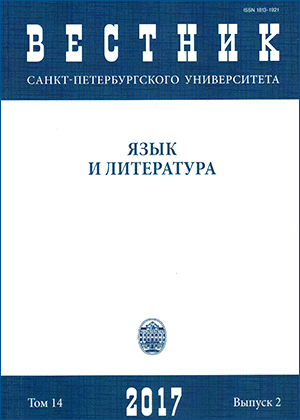Verbal Aspect in Russian and Polish Legal Texts
DOI:
https://doi.org/10.21638/11701/spbu09.2017.205Abstract
The fact that habitual actions are much more often expressed by imperfective verbs in Russian than in Polish and in Polish much often than in Czech is usually explained by invoking temporal definiteness as the semantic prototype of the perfective aspect in the East-Slavic zone and totality as the semantic prototype of the perfective in the West Slavic zone. However, Polish legal texts and codices as well as proverbs are much often formed with imperfective verbs, whereas Russian codices and proverbs use perfective verbs in habitual-pair construction or exemplifying meaning (when Russian uses a verbal noun instead of personal verb forms the perfective aspect is expressed in a dependent participle form). These differences in the use of aspect require a re-analysis of prototype semantic features of the aspect in the West-Slavic, East-Slavic and transitional zones of the Slavic languages.
Downloads
References
Bibliography:
Бондарко 1971 — Bondarko, A. V. Vid i vremia russkogo glagola [Time and aspect of the Russian verb]. Moscow, Prosveshchenie Publ., 1971. 240 p. (in Russian)
Бондарко 1996 — Bondarko, A. V. Problemy grammaticheskoi semantiki i russkoi aspektologii [Problems of grammatical semantics and Russian aspectology]. St. Petersburg, St. Petersburg State Univ. Publ., 1996. 220 p. (in Russian)
Лазинский 2016 — Lazinski, M. Funktsii infinitiva v pol’skom i russkom iazykakh: korpusnyi analiz. In: Szumska, D., Ozga, K. (eds.). Iazyk i metod [Language and method]. Vol. 3. Krakow, Uniw. Jagiellonski Publ., 2016, pp. 159–170. (in Russian)
Лазинский, Куратчик 2015 — Lazinski, M., Kuratchik, M. Pol’sko-russkii parallel’nyi korpus Varshavskogo universiteta [Russian-Polish parallel corpus of Warsaw University]. In: Szumska, D., Ozga, K. (eds.). Iazyk i metod [Language and method]. Vol. 3. Krakow, Uniw. Jagiellonski Publ., 2015, pp. 85–94. (in Russian)
Петрухина 2012 — Petruhina, E. V. Aspektual’nye kategorii glagola v russkom iazyke v sopostavlenii s cheshs- kim, slovatskim, pol’skim i bolgarskim iazykami [Aspect categories of verbs in Russian in comparison with that of Czech, Slovak, Polish and Bulgarian languages]. Moscow, Moscow State Univ. Publ., 2012. 256 p. (in Russian)
Пчелинцева 2013 — Pchelintseva, E. E. Aspektual’nye priznaki v russkikh, pol’skikh i ukrainskikh otglagol’nykh imenakh [Aspectual features in Russian, Polish and Ukrainian verbal nouns]. In: Mеdelska, J., Titarenko, E. (eds.). Dialog kultur: języki wschodniosłowiańskie w kontakcie z polszczyzną i innymi językami europejskimi [Dialogue of cultures: East Slavic languages in contact with Polish and other European languages]. Bydgoszcz, Wyd. UKW Publ., 2013, pp. 135–150. (in Russian)
Dickey 2000 — Dickey, S. M. Parameters of Slavic Aspect: A cognitive Approach. Stanford, CSLI Publ., 2000. 316 p. (in English)
Jóźwiak 2014 — Jóźwiak, K. Specyfika aspektu werbalnego w języku prawnym na przykładzie Kodeksu karnego z 1997 roku [Specificity of the speech aspect of the language of law (on the example of the criminal code 1997)]. In: Kondratczyk-Przybylska, D., Niewiadomski, A., Walewska, E. (eds.). Język współczesnego prawa: polityka a język [The language of the modern law: politics and language]. Warszawa, Uniw. Warszawski Publ., 2014, pp. 179–201. (in Polish)
Downloads
Published
How to Cite
Issue
Section
License
Articles of "Vestnik of Saint Petersburg University. Language and Literature" are open access distributed under the terms of the License Agreement with Saint Petersburg State University, which permits to the authors unrestricted distribution and self-archiving free of charge.






